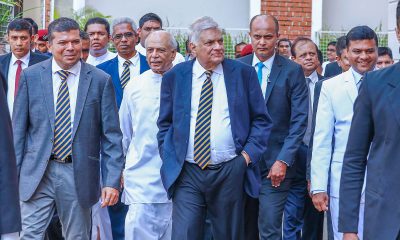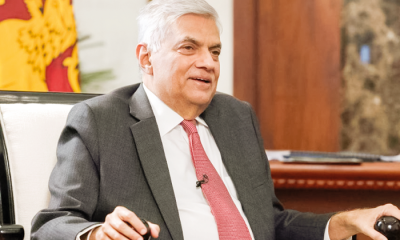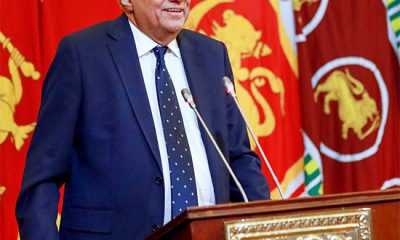News
Economic levers alone not sufficient to stimulate global economic recovery – President
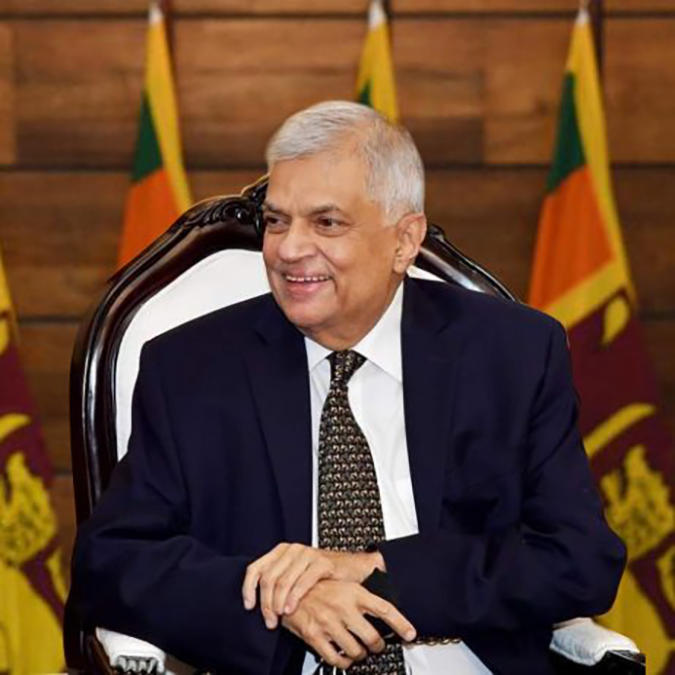
Unlike the financial crisis of 2008, the economic levers alone were insufficient to stimulate global economic recovery in 2022 as what had led to the current crisis was the consequences of evolving geopolitics, President Ranil Wickremesinghe said on Thursday at the ADB’s 55th annual meeting.
“The Ukraine war on one side and the US-China rivalry, spurred on by military, trade and political differences, on the other side, are key contributors to this breakdown in cooperation. Added to the geopolitical rivalry are the droughts, floods and pandemic which are still present in Asia. All these challenges are compounded by the absence of global leadership – a time when the global economy is stuttering. As this global rivalry intensifies into a new cold war, which will determine a new global power balance by 2050, the inability of the major countries to give leadership to the mitigation of the global climate change crisis is becoming more apparent,” he said.
Unless these issues are addressed, the developing nations of Asia are facing a bleak future, he said. Surging inflation, tighter monetary policies, decline in European output, weakening of exports is leading to weaker economic prospects for South Asia and East Asia is the current reality, he said.
Wickremesinghe said Asia is witnessing new alliances cutting across the geopolitical rivalries to mitigate global climate change further highlighting the absence of a common approach on this subject that is vital for our existence. The geopolitical rivalry to determine the contours of the Asian power balance by the mid-century has resulted in the inability of the major countries to give leadership to overcoming the key crises that are threatening the prosperity of the region.
“The resolution of these major economic and environmental issues is unfortunately interwoven with the global geopolitical crisis. As they say in many of our countries, when the elephants fight, it is the grass that is crushed. This is the predicament of many of our member countries. Therefore, we must overcome the geopolitical rivalries to address the major threats to our existence, otherwise we will all fail leading to instability in our region reminiscent of Europe after World War I. On the other hand, our ability to successfully meet these challenges will lead to remarkable progress in raising the living standards of our people through the rise of the economies of our member countries,” he said.
Supply chain shocks created by the Covid pandemic, prices of global commodities mainly food, fuel and fertiliser skyrocketing due to the Ukraine war has led to stuttering the growth of middle class and has resulted in further insecurity amongst the vulnerable communities in the Indian Ocean region, the President said.
“As a result of these shocks, there has been a spike in sovereign debt distress across emerging markets. The growth targets, both in East Asia and South Asia, have been revised downward. If this is not promptly addressed, it risks creating contagion of debt distress that threatens growth and financial stability across all economies. Countries with pre-existing economic vulnerabilities, including Sri Lanka, are the most affected. Therefore, creditors and debtor nations must work collectively in an equitable manner to ensure economic and financial stability across the region and indeed the world,” he said.
Wickremesinghe said that these developments on the global stage have further aggravated the self-inflected economic crisis in Sri Lanka resulting in a political outburst that led to a change in Government. However, the present administration has stabilized the economy and many countries and stakeholders are keenly monitoring how we resolve this crisis, he said. The President said that many nations are keenly watching developments in Sri Lanka to see how the country works with all stakeholders to resolve this crisis.
“We are well aware that the evolution of Sri Lanka’s economic crisis includes both domestic policy elements as well as external shocks. It follows that the resolution of the crisis also requires both domestic efforts and the support of external partners. It is incumbent upon Sri Lanka and our creditors and partners to set an example of how collaborative and good faith action can result in sustainable and equitable solutions to sovereign debt issues,” he said.
Sri Lanka has already undertaken major macroeconomic policy reform measures, Wickremesinghe said. Sri Lanka has now reached a Staff-Level Agreement with the International Monetary Fund on a four-year programme supported by the Extended Fund Facility. The programme is aligned with the commitment of the Government to implement an ambitious and comprehensive package of reforms that will help restore the sustainability of our public finances, addressing external imbalances, and restarting Sri Lanka’s growth engine through structural reforms and improvements in governance.
“Amidst major economic stress, Sri Lanka is undertaking an unprecedented fiscal effort as part of our commitment to restoring the country’s debt sustainability. It is our hope and expectation that Sri Lanka’s creditors, and all stakeholders, will support us in these efforts to restore our debt sustainability and help put the country back on the path of inclusive and sustainable economic growth,” he said.
Latest News
Indian PM Modi arrives in Sri Lanka on a three day state visit

Prime Minister of India Narendra Modi arrived in the island a short while ago on a three-day state visit.
The Indian Prime Minister was received at the Katunayake International Airport by Sri Lanka’s Minister of Foreign Affairs Vijitha Herath.
PM Modi is accompanied by Minister of External Affairs S. Jaishankar, Indian National Security Advisor Ajit Doval, Indian Foreign Secretary and several senior officials of the Government of India.
Latest News
Special Train Services during Sinhala and Tamil New Year
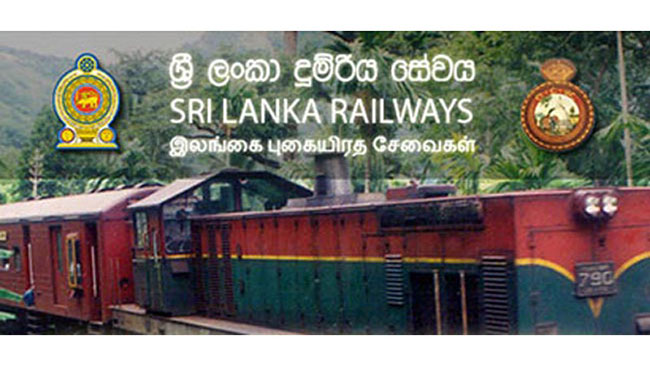
The General Manager of Railways has announced that the following special train services will operate during the Sinhala and Tamil New Year period.
1. From Colombo Fort to Badulla – departing Colombo Fort at 1930 hrs on 11th, 12th, 19th and 20th April
2. From Badulla to Colombo Fort – departing Badulla at 1750 hrs on 11th, 12th, 19th and 20th April
3. From Galle to Anuradhapura – departing Galle at 0400 hrs on 12th and 13th April
4. From Anuradhapura to Galle – departing Anuradhapura at 1500 hrs on 12th and 13th April
5. From Colombo Fort to Galle – departing Colombo Fort at 120 hrs on 10th, 11th, 15th and 20th April
6. From Galle to Colombo Fort – departing Galle at 0610 hrs on 11th, 12th, 16th and 21st April
7. From Colombo Fort to Galle – departing Colombo Fort at 1330 hrs on 12th and 13th April
8. From Colombo Fort to Kankasanthurai [Intercity Express] – departing Colombo Fort at 0530 hrs on 11th and 18th April
9. From Kankasanthurai to Colombo Fort [Intercity Express] – departing Kankasanthurai at 1350 hrs on 11th and 18th April
10. From Beliatta to Colombo Fort – departing Beliatta at 0825 hrs on 12th, 13th, 18th, 19th and 20th April
News
PM strengthens vocational education and economic ties with Germany

Prime Minister Dr. Harini Amarasuriya visited Hamburg, Germany, focusing on strengthening vocational education and economic partnerships between the two nations. During her visit, she participated in the 102nd East Asia Friendship Dinner, met with German President Frank-Walter Steinmeier, and engaged in high-level discussions on investment, education, and economic reforms.
As a Guest of Honour at the German Asia-Pacific Business Association (OAV) annual gathering, Prime Minister Amarasuriya addressed an audience of business leaders and dignitaries, emphasizing Sri Lanka’s economic recovery and its potential as a growing investment destination. She highlighted the contributions of over 160 German companies in Sri Lanka and invited further collaboration in trade and business.
In her capacity as the Minister of Education, Higher Education, and Vocational Education, the Prime Minister delivered a keynote speech at the ’German-Asian Forum on Vocational Education & Training.’ She acknowledged Germany’s decades-long support in Sri Lanka’s vocational education sector and stressed the importance of modernizing vocational training to align with industry demands. Additionally, she visited ITECH vocational school and German research hubs such as NXP Semiconductors and DESY, discussing collaboration in IT and technology-driven industries.
During her discussions with President Steinmeier, Prime Minister Amarasuriya reiterated Sri Lanka’s commitment to economic stability, social protection, and national unity. She also attended a business roundtable, where she engaged with German companies and government representatives on economic expansion, digitalization, and sustainable development initiatives.
The Prime Minister was accompanied by Sri Lanka’s Ambassador to Germany, Varuni Muthukumarana, and senior embassy officials.
[Prime Minister’s Media Division]
-

 News5 days ago
News5 days agoBid to include genocide allegation against Sri Lanka in Canada’s school curriculum thwarted
-

 Sports6 days ago
Sports6 days agoSri Lanka’s eternal search for the elusive all-rounder
-

 News7 days ago
News7 days agoGnanasara Thera urged to reveal masterminds behind Easter Sunday terror attacks
-

 Sports2 days ago
Sports2 days agoTo play or not to play is Richmond’s decision
-

 News6 days ago
News6 days agoComBank crowned Global Finance Best SME Bank in Sri Lanka for 3rd successive year
-

 Features6 days ago
Features6 days agoSanctions by The Unpunished
-

 Features6 days ago
Features6 days agoMore parliamentary giants I was privileged to know
-

 Latest News4 days ago
Latest News4 days agoIPL 2025: Rookies Ashwani and Rickelton lead Mumbai Indians to first win



